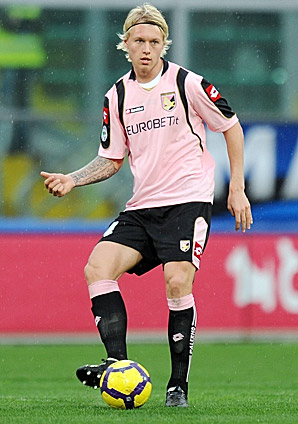
Ready for its close-up? Bundesliga in good position to raise profile
It's a bullish sentiment but not a million ways away from the Bundesliga's situation going into the 2010-11 season. The great performance by the German national team in the World Cup has given the league strong momentum to break the records it set only last year. It's already the most profitable big league in Europe (the 36 top clubs made a combined $14 million last season) and the biggest in terms of average attendance (more than 42,000 in the top flight) on the continent. On the back of Bayern Munich's strong showing in the Champions League and the club's good run in the Europa League, there's every chance a German team might win an international competition for the first time in a decade, a result that would confirm the reawakening of football's sleeping giant. If you consider that Germany is the biggest, wealthiest nation in Europe and that professional football is strongly linked to economic power, the Bundesliga has been punching well below its weight in recent years.
One man who wants to change this is Uli Hoeness. The Bayern Munich president surprised many experts this week by declaring his intention to run for president of the German Football League (DFL) against incumbent Reinhard Rauball, 63, who is also the president of the club Borussia Dortmund. Elections take place on Aug. 18, and all 36 professional clubs in the first two divisions are allowed to vote.
"If I'm elected, everybody will be better off," said Hoeness, 58, with characteristic modesty.
Some clubs will be wary of affording more power to the Bayern boss, who is already one of German football's most influential figures. Hoeness' move should not be seen solely as a political tactic, however. It also reflects his view that the DFL has real scope to grow in the next few years. Hoeness, who took over as general manager at Bayern in 1979, has turned the Bavarian giants into Germany's most successful and financially powerful entity. If he manages to repeat the trick with the whole league, everyone will be indeed be a winner.
His expertise is not in question, but there might be a few doubts about his interest for the collective good. In the past, Bayern has flirted with leaving the collective selling arrangements that governs TV rights, and it cut one slightly below-board deal with the Kirch media company, which effectively compensated Bayern for some of the money the club lost by accepting collective marketing.
"I hope that people will believe me when I say that I'll help all and work to their advantage," Hoeness said this week. "The second division would profit, especially, because there's a good chance to generate more income. That way, you can give more to the smaller clubs without taking it from the big ones."
The Bundesliga generates more money from sponsorship than its rivals but is still a poor relative when it comes to TV income. The English Premier League generates $1.6 billion a year in TV money, compared with the Bundesliga's $573 million. Hoeness' main focus, if elected, will be to fundamentally address this imbalance. Any real growth will have to come from overseas rights (a paltry $45 million per season; the EPL makes $702 million) because the potential for domestic growth is limited. The value of live Bundesliga matches is continually depressed by a free-to-air highlight show on Saturday night and quasi-legal protection for the existing setup from the German competition commission. There is no support for extending the top flight from 18 to 20 clubs and the DFL is reluctant to add new kickoff times, too.
"We won't deal negligently with our valuable product," Bundesliga CEO Christian Seifert said.
The key challenge for the Bundesliga will be to establish itself as the world's No. 2 league behind the EPL. It's not an easy task because German football has been suffering from a glamour deficit. The leading stars have preferred to play in Spain and Italy in recent decades.
Bayern has started to buck this trend by spending more than $250 million on stars since 2007, including Italian striker Luca Toni (now back In Genua), French winger Franck Ribery and Netherlands winger Arjen Robben. Munich's strength is also its biggest weakness, however; since Dortmund nearly buckled under a mountain of debt five years ago, no one has been able to challenge the record championship winner in financial terms.
Werder Bremen and VfB Stuttgart have a real fight on their hands to keep Mesut Ozil and Sami Khedira, respectively, from leaving this season. Only Wolfsburg has bought a foreign star player from the World Cup so far, with Danish defender Simon Kjaer coming for $13 million from Italian club Palermo. It's a classic chicken-and-egg situation: Without more money from abroad, the DFL will continue to find it hard to attract top international talent and vice versa.
The league's fiscal prudence should nevertheless put it in a decent position to benefit from the problems (namely massive debt) elsewhere. Regaining a fourth Champions Leagues starting place from 2012 onward will also help. The fact that Hoeness has decided to move in now bodes well for the German game. The man is not in the habit of backing lost causes.




